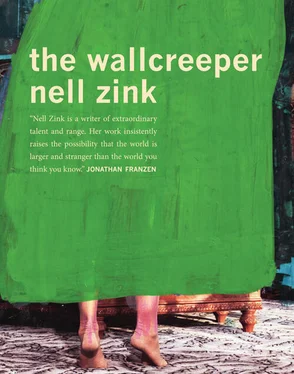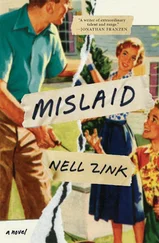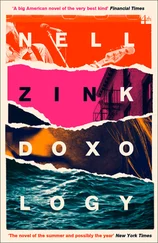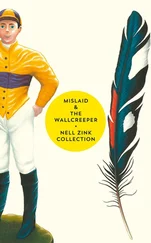Stephen put his arm around my shoulder.
“Are we in on the contraption?” I asked.
“I have options that vest in four years.”
On weekends I was always home by one o’clock. Stephen would stay out until whenever and then sleep, sleep, sleep. He took a break from birding. I didn’t mind. There’s something nice about keeping quiet so as not to wake a fluffy man dozing in a fluffy bed. I read fewer novels and more bird books, learning something new every day. Always simple stuff that afterwards I was ashamed to admit I hadn’t known.
Like birds nesting on the ground. How was I to know they’re so dumb they would build a nest on the ground under a tree, instead of up in the tree? So that when the foxes come, the baby birds are doomed. It gave the concept of the Easter egg hunt a sinister new meaning. Hungry little kids out wandering around after a long winter indoors, scanning the ground.
I learned that power lines fry birds. Poof! They’re gone. Every time I saw an electric fence on a walk, I imagined little birds sitting on it and poofing into nothingness. That was before Stephen advised me to hold on to an electric fence for a while. It tingles once a second. It might kill a spider, assuming the spider was grounded. I was hard put to imagine why it would slow down a cow.
I learned that kinglets are the smallest birds in central Europe, with eggs no larger than a pea.
Once Stephen was awake, it became hard to concentrate. He had exploited the occasion of our move to hook up his monitors. Sometimes his music sounded like a container ship that had grounded on a shoal and was slowly falling over. Sometimes it sounded like a war movie equalized for projection on the moon. Notions of volume in the post-reggae world put grindcore to shame. Loose sheets of paper on his desk would rise and fall with the bass. If the house had been newer, the roof tiles would have rattled. But it was soft, with fungi and moss as integral elements in the construction, so nothing really rattled much except the glass aftershave bottles on the ceramic shelf over the sink.
We didn’t take a birding vacation that year. Without asking me, Stephen rented an apartment in Berlin for the month of June. He wanted to get serious about his music.
We took the slow train, a boxy Swiss IC where you could sprawl out and eat muffins. The German high-speed trains are cylindrical, like airplane fuselages, and you can’t open the windows.
In Berne you could always tell yourself, I will lift up mine eyes unto the hills, from whence cometh my help. Berlin was huge and flat, repetitive to the point of bleakness. People were too rich or too poor, and there was nothing to buy. Tawdry crap for teenagers from the sticks, flagship stores, boutiques for Russians, espresso, and fast food. Families shivering in the dark shade of beer gardens, letting their kids run around to warm up.
I rode a heavy bicycle from our rental to the old Tempelhof airport almost every day to see the skylarks fight off the crows with their weapon of song. The crows walked spread out in teams like policemen looking for a corpse in the woods, turning their heads from side to side, staring at the grass with one monocled eye and then the other, but I never saw one eat a baby skylark. Or maybe I always lowered my binoculars in time.
There were lakes with swimmers, boaters, mallards, and coots. Out of town the lakes had grebes and divers, supposedly, but we never got around to leaving town. Stephen slept in. He almost never went to bed before noon. He was occasionally awake early enough to get down to Hard Wax and hear some new dubplate before it closed.
Exactly once, he convinced me to meet him at the Berghain at six o’clock on a Sunday morning. I didn’t get in. He had told me to dress for dancing, and I had sneakers on. The other girls in line (I was amazed that there was a line) were bouncing on their toes to keep from teetering on their heels, wearing dresses that would have showed the sweat if they hadn’t been so dehydrated their eyes looked like chalk. I hugged myself in my hoodie and shivered, obediently going home on request.
No one was sleek or fluffy in Berlin, not even me. In four weeks I didn’t see a single good-looking person on the street. Once in an upscale beer garden in a park I saw young moms and dads who seemed to have gotten some sleep. But everyone else was ashen, and too warmly dressed. It would be in the sixties, and the girls would be wearing army surplus overcoats and ski caps with pompoms, skin all wintry and sallow as if they had consumed nothing but nicotine and pasta for the last six months and lived in dungeons. The boys appeared even on chilly days in T-shirts, their faces flushed with beer. People routinely wore clothes that didn’t fit at all, with wrists and belly buttons hanging out.
Except for the space-needle-type TV towers, there was no place to look down at anything. You were always looking out and up until your gaze was arrested by the next moving car.
Every time we ate out we became mildly physically ill.
Accordingly, Stephen insisted we move there. He said Berlin was where he’d always wanted to live. Berne had just been a way of getting to Europe. He had met more interesting people in four weeks in Berlin than in three years in Berne.
Given that so far as I knew he liked nothing better than electronic dance music and shore birds, I had to believe him.
He said the company had a device in development in Berlin, a little pump that had potential as an artificial pancreas, spleen, gallbladder, pituitary gland or anything else you care to name. He said my visa wouldn’t let me stay in Switzerland without him unless I got a job all my own, which I would have to apply for from outside the country. Stephen held the keys to my heart.
But wanting to move to Berlin and actually being transferred there are two different things, even for an executive, and Stephen was a researcher.
At home in Berne, I went out to shop for food (a fun thing to do, because you can stroll down the arcades buying one vegetable from each stand) one evening and saw Stephen in a café, poring over papers, sitting next to a strikingly pretty girl with blonde ringlets. I started over, but when I saw she had tousled her hair with mousse to cover bald patches, I backed up and kept on down the arcade trying to find truly fresh radicchio, which is never easy. She looked like a cancer patient, maybe someone Stephen met at a clinical test of the pump, which ought to work for chemo — I had it all mapped out.
When Stephen got home I asked who she was, and he said, “Miss Mangy Dread.” That night at the club he had told her she looked like the alien in Alien , and the next time he passed the ad agency, the carpet was gone. He went inside to say hello. Her roots had suffered a bit, but she was confident her hair would grow back.
The most conspicuous thing in the shop, he said, was a poster: Wasserkraft Nein Danke. Hydroelectric power, no thanks. It was based on the perennial anti-nuclear campaign. But hydroelectric? And there Miss Mangy Dread, whose name was Birke, explained to him that the upper Rhine, since the 1950s, had been “massacred” with a canal and ten “dam steps” all the way from Basel to Iffezheim. The fertile floodplains, gone! High water into the cities of the Ruhr! Basins for holding back the water, but no wet meadows, no frogs, no storks, no life, and why? Because the power companies are taking a license to print money, earning themselves silly on this river! All the consequences carries the public, the taxpayer: flood protection for the cities, because now there are floods, since they build the dams. The loss of biodiversity, of the landscape, of the beauty of the countryside. It is no more a river, only a chain of lakes, and all emitting methane in tremendous quantities! Carbon dioxide is nothing, who cares about carbon dioxide? Methane is seventy, a hundred times worst! And the companies pay the turbines and the dam, nothing else! And they want to build five more steps, from Iffezheim to Mannheim! And all these dams together, they make only so much electricity like one modern gas electric plant!
Читать дальше
Конец ознакомительного отрывка
Купить книгу










